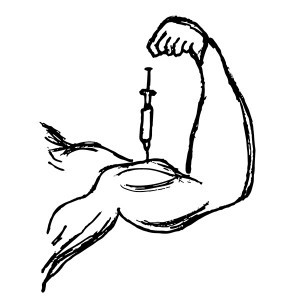Lehigh wrestling coach Pat Santoro has been leading the team for the last eight seasons. A writer from The Brown and White sat down Santoro to discuss the issue of steroids and performance-enhancing drugs in wrestling.
Q: Do most Division I college wrestling teams drug test their players internally, without the NCAA involved?
Pat Santoro: I think it varies from program to program. We’re on our guys pretty good, but that doesn’t mean our guys are perfect by any means. But for us, it’s something that kind of gives us a lot of social pressure. Our guys know that this is important, and this isn’t the way you do it. There’s lots of ways to do it. I think when people ever do any types of drugs or PEDs, they rationalize. They figure, “Well the other guys are probably doing it.”
Q: Do you have specific consequences for PED use that you tell your wrestlers at the beginning of the year?
PS: If the NCAA catches you, you are banned for a year for any drugs. If we catch someone, there is a protocol we have. Obviously, there is a suspension, and then you have to meet with people at the school. There is a whole protocol on classes you have to take. So it’s more of an educational thing. If we have a second or third offense, you can be removed from the team, lose scholarships and things like that.
Q: Do you think it’s possible for someone to use PEDs for a short amount of time, and if they know or guess when the testing is happening they stop using PEDs, and thus still have an advantage?
PS: I think that there are residual (effects), like keep(ing) residual strength. I don’t know how accurate the tests are, I don’t know. I do think when it comes to professionals — and these are NCAA guys — but for professionals, and even Olympics, I always think the guys using are a couple years ahead of the drug testers. You always hear stories of guys beating drug tests.
Q: Does the NCAA notify the coaches before a drug test, or is it completely random?
PS: We find out a day before. I don’t want our athletes to know until the day of because the more time someone has, there’s always ways out there. We don’t tell our guys, “Hey, we are going to drug test tomorrow. Don’t show up for practice, we are drug testing by the way.” We don’t want anyone finding a way out of it or a way to beat it. Not that I think our guys are going to do that. It’s just to take all questions out of it.
Q: Are your own drug tests very similar to the NCAA drug tests?
PS: That I couldn’t tell you. I don’t know what they use. We have a pretty good one though. Our trainer researches (the drug test) pretty in depth, and the company we use is one of the best ones out there. I don’t know if it’s better or the same as the NCAA. I don’t know what the NCAA uses.
Q: What are your policies regarding legal NCAA supplements, like protein powder or Creatin?
PS: I guess those are personal preferences. There is not a whole lot of research, I believe, that supports their claims. A lot of times it’s an expense you don’t need to have as a college student. I think a healthy diet is probably the best way to go. It doesn’t mean maybe sometimes there might be a time and place where someone can take a protein supplement. All it is a supplement. Maybe between classes, or when they go and get something to eat for supplemental use. But it shouldn’t be, “I am going to take this, and I going to conquer the world with it.”
Q: Do you recommend legal NCAA substances?
PS: I don’t really recommend it. I think there is a time and a place. Every case is individual. If it’s a case where the (wrestler) works out and goes to a class, a Powerbar or protein shake are probably pretty important.
Q: Have you had any past experiences with the NCAA catching your athletes using PEDs?
PS: No, but you hear about it every year in the NCAA magazine and in the news. It happens every year. Sometimes it is really innocent where someone gets something over the counter at a local distributor and they didn’t even know. They did one test, and I don’t know the exact research, but it’s close to a third of the supplements they pulled off the shelf had some kind of illegal substance where the kids don’t know that. They are going in there and the parents are buying something, thinking I got a protein shake but there might be something mixed in there where they’re not supposed to have. That is the scary part. The NCAA is very clear in that you are responsible for everything that you put into your body. Just because your teammates are doing it doesn’t mean it’s legal.






Comment policy
Comments posted to The Brown and White website are reviewed by a moderator before being approved. Incendiary speech or harassing language, including comments targeted at individuals, may be deemed unacceptable and not published. Spam and other soliciting will also be declined.
The Brown and White also reserves the right to not publish entirely anonymous comments.